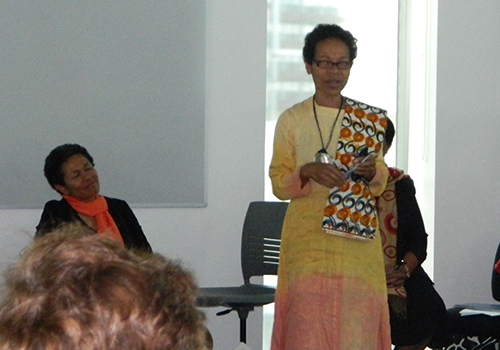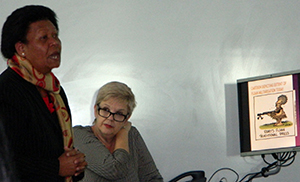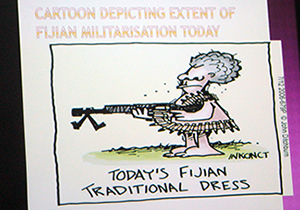
AUCKLAND (Pacific Media Watch): The Fijian military is taking up too much of the national budget and ordinary citizens are losing out on vital health and social welfare benefits as a result, an Asia-Pacific conference has been told.
This was the view of researchers and campaigners speaking at the Women's International League for Peace and Freedom Asia-Pacific conference held this weekend at the Auckland University of Technology.
Adi Asenaca Uluiviti of the Coalition for Democracy in Fiji and the Nuclear-Free and Independent Pacific (NFIP) movement said: "The military is excessively consuming a lot of our national budget in Fiji....an incredible amount of money for an institution that is just killing off our humanity".
As a military state, the army frequently crossed the "civil-political versus defence-protective regime divide", Uluiviti added.
Since 1987, there have been five coups in Fiji, four different constitutions have been adopted but only three general elections have been held. The country has been ruled by emergency decree for the past eight years.
In Fiji, there is censure of the media, NGOs, churches, chiefs and indigenous institutions, said Uluiviti.
Uluiviti said that even women's NGOs which did mainly anti-family violence work were affected by a new military decree which banned any organisation funded (even partly) from overseas from taking part in any political discussions.
'Deconstructing institutions'
The most recent coup d'etat in Fiji in 2006 had seen the army involving itself in "deconstructing indigenous institutions", she added.
As part of the dismantling of these indigenous institutions, "we are now all called Fijians, something that the indigenous have traditionally claimed for ourselves" Uluiviti added.
While there is still a "glorification of things military", a glimmer of hope could be found in the fact that elections will be held for the first time in eight years on September 17 with four political parties headed by women.
These are the union-based FSDP headed by Sivia Qoro, the Fiji Labour Party headed by La Padarath, the National Federation Party; headed by Tupou Draunidalo; and Sodelpa headed by Ro Teimumu.
However, their chances are unclear because as Radio New Zealand International reported recently, Bainimarama is currently claiming that he is the only candidate confirmed to be taking part in the election even though he admitted last week thathe had flouted his own military electoral decree by failing to register his "Fiji First" political party.
RNZI reported that the registration of the party was still some weeks away. According to the military decree, parties are not allowed to start campaigning until they have registered but Bainimarama has already been touring the country in a bus bearing his party's name.
 Ema Tagicakibau of the IANSA Womens Network and the Pacific Small Arms Action Group told the conference that she had to leave Fiji four years ago against her will. "It was a choice that was forced on me because it was difficult to continue my work as the media and NGOs were being harassed" she said.
Ema Tagicakibau of the IANSA Womens Network and the Pacific Small Arms Action Group told the conference that she had to leave Fiji four years ago against her will. "It was a choice that was forced on me because it was difficult to continue my work as the media and NGOs were being harassed" she said.
Harrowing photographs
Tagicakibau showed harrowing photographs of soldiers disrupting a session of Parliament and dragging out the secretary-general.
Fiji was expanding its military to take part in numerous peacekeeping operations, at the cost of spending on social welfare and health, Tagicakibau said. "It is killing us now" she added.
Fiji was involved in peacekeeping missions in Kosovo, the Sudan and even the Golan Heights. On these peacekeeping missions, the Fijian army was learning how to set up checkpoints and other things that are not beneficial to the people of Fiji, she added.
"So straight after every coup, the checkpoints go up" said Tagicakibau.
 Fiji had become a "fatherless society" because so many men had joined the military. Women who protested against the increased militarisation of Fiji were rounded up and taken to military camps where they were beaten up.
Fiji had become a "fatherless society" because so many men had joined the military. Women who protested against the increased militarisation of Fiji were rounded up and taken to military camps where they were beaten up.
Young girls were told to join cadet training programmes "to instil discipline", Tagicakibau added.
Meanwhile, although a number of Fijian organisations and the New Zealand Council of Trade Unions have expressed doubt that the September elections will be free and fair, New Zealand's Murray McCully said today that New Zealand would accept the outcome of the elections.
The Fiji Labour Party president, Lavinia Padarath, had accused the governments of New Zealand and Australia of "getting behind a flawed process without any regard as to whether it is free and fair", Radio New Zealand International reported.
This work is licensed under a Creative Commons Attribution-NonCommercial 3.0 New Zealand Licence.




